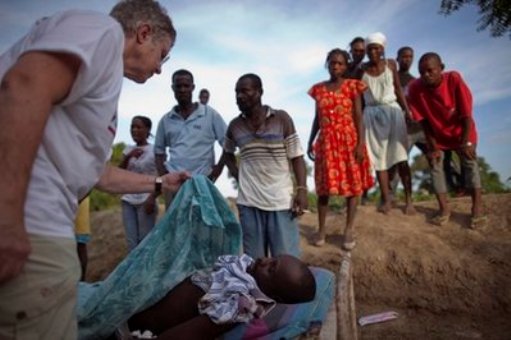 Seoul – Mass cholera vaccinations can be beneficial in affected areas even after outbreaks of the bacterial disease, according to two studies by researchers from the Seoul-based International Vaccine Institute (IVI).Results of the studies recently appeared in PLoS Neglected Tropical Diseases, a peer-reviewed open-access online journal published by the Public Library of Science, a non-profit organization of scientists and physicians with headquarters in San Francisco.Experts say the findings are especially significant in light of the outbreak of cholera, known as “the poor man’s disease,” in Haiti, which was hit by a massive earthquake in January 2010.”The recent outbreaks of cholera in Haiti, Pakistan and Zimbabwe suggest that current global action plans against cholera are failing,” wrote Edward T. Ryan, a physician at Massachusetts General Hospital in the United States, in an editorial accompanying publication of the studies.”Although everyone agrees that the ultimate prevention and control of cholera will require provision of clean water and adequate sanitation to the world’s population, the simple fact is that this will not be a reality for decades for the world’s most impoverished, as well as for those affected by civil unrest and natural disasters,” Ryan said.”Less clear is the role that cholera vaccine could play once an outbreak has started.”Every year, between three million and five million people are infected with the Vibrio cholerae bacterium, the causative agent of cholera. Symptoms include severe diarrhoea and dehydration. Left untreated, cholera can be fatal in hours.in one of the studies, Dang Duc Anh, Anna Lena Lopez and colleagues at IVI and in Vietnam describe a case-control study of an oral vaccine containing killed cholera pathogens that was administered during a cholera outbreak in Hanoi three years ago. the vaccine was found to provide protective efficacy of 76 per cent.”The findings from this study suggest that reactive use of killed oral cholera vaccines provides protection against the disease and may be a potential tool in times of outbreaks. further studies must be conducted to confirm these,” the study’s authors wrote.in the other study, IVI researchers including Rita Reyburn, Lorenz von Seidlein and John Clemens evaluated the potential benefit of reactive cholera vaccination campaigns.they used existing data from cholera outbreaks to simulate the number of preventable cholera cases, assuming that 50-75 per cent of the target population would participate and that immunizing the community would take between 10 and 33 weeks following the first report of an outbreak.”Even a delayed response can save a substantial number of cases and deaths in long, drawn-out outbreaks,” the authors of the study wrote. Most importantly, they added, decision-makers in donor and recipient countries have to be convinced of the benefit of reactive cholera vaccinations.
Seoul – Mass cholera vaccinations can be beneficial in affected areas even after outbreaks of the bacterial disease, according to two studies by researchers from the Seoul-based International Vaccine Institute (IVI).Results of the studies recently appeared in PLoS Neglected Tropical Diseases, a peer-reviewed open-access online journal published by the Public Library of Science, a non-profit organization of scientists and physicians with headquarters in San Francisco.Experts say the findings are especially significant in light of the outbreak of cholera, known as “the poor man’s disease,” in Haiti, which was hit by a massive earthquake in January 2010.”The recent outbreaks of cholera in Haiti, Pakistan and Zimbabwe suggest that current global action plans against cholera are failing,” wrote Edward T. Ryan, a physician at Massachusetts General Hospital in the United States, in an editorial accompanying publication of the studies.”Although everyone agrees that the ultimate prevention and control of cholera will require provision of clean water and adequate sanitation to the world’s population, the simple fact is that this will not be a reality for decades for the world’s most impoverished, as well as for those affected by civil unrest and natural disasters,” Ryan said.”Less clear is the role that cholera vaccine could play once an outbreak has started.”Every year, between three million and five million people are infected with the Vibrio cholerae bacterium, the causative agent of cholera. Symptoms include severe diarrhoea and dehydration. Left untreated, cholera can be fatal in hours.in one of the studies, Dang Duc Anh, Anna Lena Lopez and colleagues at IVI and in Vietnam describe a case-control study of an oral vaccine containing killed cholera pathogens that was administered during a cholera outbreak in Hanoi three years ago. the vaccine was found to provide protective efficacy of 76 per cent.”The findings from this study suggest that reactive use of killed oral cholera vaccines provides protection against the disease and may be a potential tool in times of outbreaks. further studies must be conducted to confirm these,” the study’s authors wrote.in the other study, IVI researchers including Rita Reyburn, Lorenz von Seidlein and John Clemens evaluated the potential benefit of reactive cholera vaccination campaigns.they used existing data from cholera outbreaks to simulate the number of preventable cholera cases, assuming that 50-75 per cent of the target population would participate and that immunizing the community would take between 10 and 33 weeks following the first report of an outbreak.”Even a delayed response can save a substantial number of cases and deaths in long, drawn-out outbreaks,” the authors of the study wrote. Most importantly, they added, decision-makers in donor and recipient countries have to be convinced of the benefit of reactive cholera vaccinations.
Mass cholera vaccinations beneficial post-outbreak, studies find
Previous post: Information on Pregnancy Symptoms and Morning Sickness